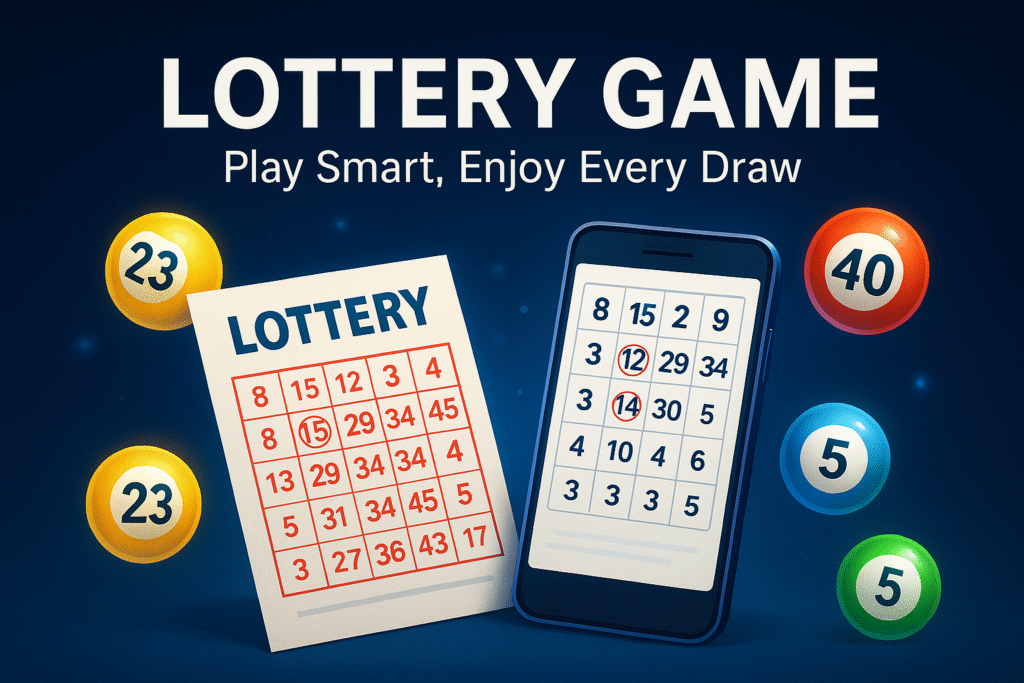A lottery game is one of the simplest forms of gambling: you buy a ticket, pick your numbers (or let the system do it), and wait for the draw. The rules are easy, but if you want to enjoy the experience without hurting your finances, you need to understand the odds, the prize structure, and how to manage your budget.
This guide explains how a typical lottery game works, the main types of games you’ll see, and practical tips to keep your play fun and under control.
How a Lottery Game Works
While exact formats differ between countries, most traditional lottery games follow the same basic pattern:
-
Number Selection
-
You choose a set of numbers from a given range (for example, 6 numbers from 1–49).
-
Some games use bonus balls or “special numbers” drawn from a separate pool.
-
-
Ticket Purchase
-
You buy a ticket with your chosen numbers, either in-store or online.
-
You can usually buy for one draw or multiple future draws.
-
-
The Draw
-
At a scheduled time, the lottery operator draws the winning numbers using a mechanical machine or certified random system.
-
If your ticket matches enough of the drawn numbers, you win a prize.
-
-
Prize Claims
-
Small prizes can usually be claimed at retailers or automatically credited online.
-
Larger wins must be claimed directly from the lottery authority, following identification and verification checks.
-
Types of Lottery Games You Might Play
1. Classic Jackpot Draws
These are the big weekly or twice-weekly games you see on TV:
-
You pick several numbers from a large range.
-
Jackpots can roll over when nobody wins, sometimes reaching very high amounts.
-
Multiple prize tiers reward partial matches.
These games offer huge potential but very long odds, especially at the jackpot level.
2. Daily Numbers Games
Daily or “Pick” games (such as Pick 3 or Pick 4) are:
-
Drawn once or twice every day.
-
Based on short number combinations (e.g., three or four digits, 0–9).
-
Usually allow different play types such as Straight, Box, or Combos.
They do not pay life-changing sums, but they have better odds of smaller wins and very fast results.
3. Instant Win and Scratch-Style Games
These include:
-
Physical scratch cards
-
Digital instant-win games
You reveal symbols or numbers immediately to see if you’ve won. The prizes are usually smaller than main jackpot draws, but the excitement is instant and straightforward.
Understanding Odds and Prize Tiers
Every lottery game publishes its odds and prize breakdown. Reading these is one of the smartest things you can do before playing.
-
Jackpot odds are usually extremely long (millions to one).
-
Middle tiers (for example, matching 4 or 5 numbers) have better odds and often pay decent amounts.
-
Lower tiers might return small prizes or free tickets.
Remember:
-
The lottery is a negative-expectation game. Over time, the operator must make a profit.
-
You cannot “beat” the odds with patterns or systems, but you can choose games with prize structures that you personally prefer.
Picking Numbers: What Matters and What Doesn’t
You can choose numbers for any lottery game in several ways, but some beliefs are myths.
Quick Pick vs Manual Numbers
-
Quick Pick: The system randomly chooses your numbers.
-
Manual: You select them yourself (birthdays, lucky numbers, patterns, etc.).
From a probability point of view, both are equally random. There is no inherent advantage to either method.
Avoiding Overcrowded Choices
Patterns don’t change the odds of winning, but they can affect whether you share a prize:
-
Many people use birthdays and anniversaries (1–31), making those numbers more common.
-
Simple sequences (1–2–3–4–5–6) or lines on the playslip are also popular.
If you want to reduce the chance of splitting a big prize, consider:
-
Mixing low and high numbers over the full range.
-
Avoiding obvious visual patterns.
You won’t win more often, but if you do hit a large prize, you’re more likely to keep it to yourself.
Bankroll Management: The Real “Strategy” in Lottery Play
Since you can’t control the draw, the one thing you can control is your budget.
Set a Clear Lottery Budget
Decide in advance:
-
How much you can afford to spend on lottery games per week or month.
-
Treat that amount like an entertainment cost, similar to movies or streaming.
Never use money needed for rent, food, debt payments, or savings.
Plan Tickets, Not Hopes
Instead of buying a huge block of tickets when the jackpot looks exciting:
-
Spread your budget over multiple draws.
-
Example: Instead of 20 lines in one draw, buy 5 lines across four draws.
This gives you more regular fun without overspending on a single night.
Avoid Chasing Losses
Losing several draws in a row is normal. Don’t:
-
Increase your ticket count dramatically to “win it back.”
-
Empty your wallet because “the jackpot must drop soon.”
Each draw is independent; the balls do not remember past results.
Syndicates and Group Play
A lottery syndicate is a group where multiple people share the cost of many tickets and split any prizes.
Advantages:
-
More combinations covered for less individual money.
-
Better chances of winning something.
Disadvantages:
-
Any prize (even the jackpot) is divided among members.
-
Requires trust and clear rules on contributions and payouts.
Syndicates are useful if you want more coverage without increasing your personal spend—just make sure agreements are written or clearly documented.
Playing Lottery Games Online Safely
Many official operators now allow online entries:
-
Use only licensed, official sites or apps.
-
Check how they confirm ticket ownership (email receipts, account history).
-
Understand how you’ll be notified if you win and how to claim.
Always protect your account with strong passwords and, where possible, two-factor authentication.
Responsible Gaming: Keeping the Lottery Fun
A lottery game should be exciting and hopeful, not stressful.
Keep these principles in mind:
-
See lottery tickets as small chances at a pleasant surprise, never a financial plan.
-
Take breaks if you feel preoccupied with draws or tempted to go over budget.
-
Use deposit limits, spending caps, or self-exclusion tools if the operator provides them.
-
If gambling begins to affect your mood, relationships, or money, seek professional help or a support service.
The real win is enjoying the game while staying fully in control of your life and finances.
Conclusion
A lottery game is easy to play but requires discipline to play well. You cannot control the winning numbers, but you can control:
-
How much you spend
-
How often you play
-
Which games and prize structures you choose
-
Whether you play alone or in a syndicate
With a clear budget, realistic expectations, and a focus on fun instead of pressure, every draw becomes just that—a fun moment where anything might happen, but nothing essential depends on it.


